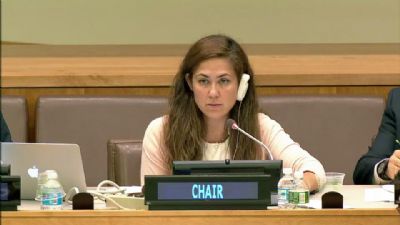The United States representative pointed out at the end of the day that only 2 of 43 applications from the "Global North" list (that is, NGOs from mainly Western countries) were recommended for accreditation. Significantly, the applications considered were from NGOs that have had their applications already deferred at least once. Members of the Committee can, and often do, defer applications session after session with inappropriate, specious or repetitive questions and demands of the NGOs.
Among the organizations blocked:
- Russia blocked the US Committee for Human Rights in North Korea, asking for a list of funding sources. The U.S. representative pointed out that such information was already available, but Russia insisted it wanted updated information for 2016, which the organization couldn't have provided since the application had been deferred from 2015.
- Russia and Iran blocked a pair of organizations working in Syria, including the Syrian American Medical Society Foundation, to which Iran asked why it did not operate in areas controlled by the Syrian regime and only in areas controlled by "terrorists" and "armed rebel groups." The American representative pointed out that the question had already been asked and answered, with the organization explaining it had not received adequate security guarantees in regime-controlled areas. Iran ignored the response and demanded to know if the organization remained in areas now retaken by the Syrian regime forces.
- Two Estonian NGOs were once again blocked by Russia, which continued accusing one of being connected with a "terrorist" and the other of promoting "separatism". An Estonian government representative, invited to speak as an observer, expressed their dismay about the repeated deferrals for unclear reasons - to no avail.
- Russia blocked the "Andrey Rylkov Foundation" for a second time this year, as well as the "Interregional Non-Governmental Organization 'Committee Against Torture'", asking questions about the latter's connections with an organization deemed "undesirable" by the Russian government.
- Cuba blocked the "National Democratic Institute for International Affairs" by asking a question on its activities in undemocratic Bolivia, even though the NGO does not list Bolivia as one of the countries in which it works. Last year, the organization's chairwoman, former U.S. Secretary of State Madeleine Albright, penned an op-ed discussing the politically motivated murders of a pair of Bolivian politicians.
- Cuba also derailed accreditation for the "Database Center for North Korean Human Rights", asking if it had contacts with institutions and academics in North Korea (notwithstanding free human rights institutions don't operate in North Korea).

